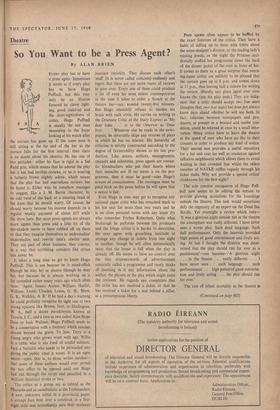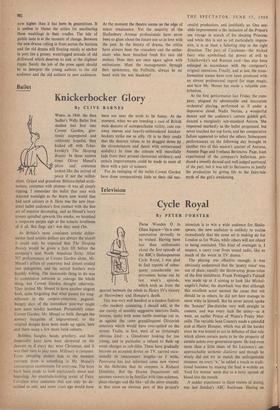Theatre
So You Want to be a Press Agent?
By ALAN BRIEN EVERY play has to have a press agent. Sometimes it seems as if every play has to have Hugo Puffball, but this may only be an illusion fostered by clever light- ing, good make-up and the short-signtedness of critics. Hugo Puffball is usually the last man remaining in the foyer looking at his watch after the curtain has gone up. If the same man is still sitting at the far end of the bar as the curtain falls for the first interval, then there is no doubt about his identity. He has one of two attitudes : either his face is rigid in a Sid Field grin, which means that he adored the play but it has had terrible reviews, or he is wearing a fatherly frown slightly askew, which means that the play has had marvellous reviews but he hated it. Either way he somehow manages to suggest, like a J. M. Barrie character, by an odd twist of the back or a cunning bend of the knee that he should worry. Of course, he should worry because his income depends on a regular weekly payment of about £15 while the show lasts. But most press agents are always more agents than press and a little bit of the eye-shadow seems to have rubbed off on them so that they imagine themselves as understudies' understudies and rewrite men's rewrite men. They are part of show business, they convey, in a way that scribbling outsiders like critics can never be.
It takes a long time to get to know Hugo Puffball. This is not because he is stand-offish (though he may be) or elusive (though he may be), but because he is always working on a list compiled rather many years ago which often runs: 'Agate, James; Archer, William; Hazlitt, William; Lamb, Charles; Lewes, G. H.; Shaw, G. B.; Walkley, A. B.' If he had a day's warning he could probably recognise by sight one or two young upstarts like Brown, Ivor, or Darlington, W. A., half a dozen pseudonyms known as Trewin, J. C., and a tyro or two called Alan Hope Dent or Jock Wallace. Hugo Puffball tends to be a conservative with a memory which reaches almost beyond the grave. To him, Terry is a Young angry who grows wiser with age, Willie is a cynic who is too fond of sordid subjects, Jack a Socialist who needs to be persuaded into giving the public what it wants. It is an open secret—open, that is, to those within earshot— that none of these authors would ever permit the box office to be opened until our Hugo had run through the script and pencilled in a brilliant theatrical stroke or two.
• The critics as a group are as inbred as the Pharaohs and as cannibalistic as the Trobrianders. A new, unknown initial in a provincial paper, a strange face bent over a notebook in a first- night aisle seat immediately stirs their restlessly insecure curiosity. They discuss each other's 'stuff' (it is never called criticism) endlessly and regret that there are not more reams of reviews to pore over. Every one of them could produce a list of even his most minor contemporaries in the time it takes to order a Scotch at the theatre bar—say, around twenty-five minutes. But Hugo resolutely refuses to burden his brain with such trivia. He carries on writing to the Dramatic Critic of the Daily Express as 'My dear John . . or to the Observer as 'Dear Ivor. . . .' Whatever else he reads in the news- papers, he invariably skips any reviews of plays in which he has no interest. His hierarchy of criticism is strictly constructed according to the degree of favourability shown to his last pro- duction. Like actors, authors, managements, cleaners and usherettes, press agents are roman- tic bloodsuckers who put their hearts where their tentacles are. If my name is on the pro- gramme, then it must be good—runs Hugo's stream of consciousness The meringue must be piled thick on the prose before he will agree that a notice is fair.
Even Hugo in time may get to recognise any national paper critic who has remained stuck to his hot seat for more than two years and he is on close personal terms with any lesser fry who remember Forbes Robertson. Quite what brokerage he performs between the producers and the fringe critics it is harder to determine. He may agree with grumbling lassitude to arrange any change in tickets from one night to another, though he will often automatically insist that the house is full when the play is already off. He seems to have no control over the thin sixpennyworth of advertisements comically called a programme and rarely thinks of inserting in it any information about the author, the players or the play which might assist the reviewer. He regards any complaints that the critic has not received a ticket, or that he has received a ticket for a seat behind a pillar, as a presumptuous liberty. Press agents often appear to be baffled by the exact function of the critics. They have a habit of sidling up to them with titbits about the scene-designer's divorce, or the leading lady's missing jewels, or the night the Princess acci- dentally stuffed her programme dowr the back of the dinner jacket of the man in front of her. It comes to them as a great surprise that morn- ing-paper critics are unlikely to be pleased that the curtain goes up at 8 p.m. and comes down at 11 p.m., thus leaving half a minute for writing the review. (Hardly any press agent ever even knows the time his play ends.) They are indig- nant that a critic should accept two free seats (imagine that, two free seats) but does not always know days ahead whether he will use both. In fact, relations between newspapers and pro- ducers, at present in a bruised and tender con- dition, could be relieved at once by a small inno- vation. Many critics have to leave the theatre at the speed of men who have set fire to their trousers in order to produce any kind of notice. Their second seat provides a useful repository for a hat and coat (as well as insulation against talkative neighbours) which allows them to avoid waiting in that crowded line whilst the oldest member of NATKE ruffles vaguely through his ticket stubs. Why not provide a special critics' cloakroom for the first night?
The sole creative occupation of Hugo Puff- ball now seems to be editing the notices to provide glowing quotations for the hoardings outside the theatre. This task would sometimes defy the ingenuity of an expert on the Dead Sea Scrolls. Yet overnight a review which runs— 'It was a glorious night outside but in the theatre the atmosphere was vastly different. I have never seen a worse play. Such dead language. Such dull performances. Only the intervals provided high points of good conversation and lively act- ing. At last I thought the director was deter- mined that the play should run for ever as a punishment'—can become—'A glorious night . . in the theatre . . . vastly different. . . . I have never seen . . . such language . . . such performances . . high points/of good conversa- tion and lively acting . . the play should run for ever.'
The rate of infant mortality in the theatre is
(Continued on page 882)
now higher than it has been in generations. It is useless to blame the critics for smothering these weaklings in their cradles. The tide of public taste is at the moment of change. Between the new drama rolling in from across the horizon and the old drama still floating stately at anchor in port lies a greasy, waterlogged armada of old driftwood which deserves to sink at the slightest ripple. Surely the job of the press agent should be to interpret the young authors to the old audience and the old authors to new audiences. At the moment the theatre seems on the edge of minor renaissance. Yet the majority of the Shaftesbury Avenue professionals have never been so glum about the future nor so in love with the past. In the history of drama, the critics have always been the crusaders and the enthu- siasts who have breathed fresh fire into old embers. Now they are once again aglow with enthusiasm. Must the managements through their spokesmen, the Puffballs, always be on hand with the wet blankets?











































 Previous page
Previous page